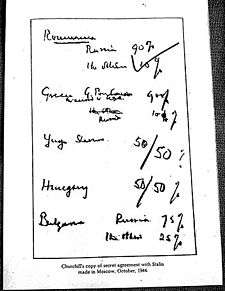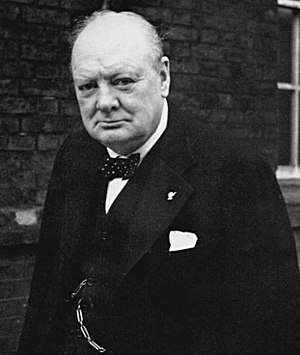Percentages agreement
The Percentages agreement was a secret informal agreement between British prime minister Winston Churchill and Soviet leader Joseph Stalin during the Fourth Moscow Conference in October 1944. It gave the percentage division of control over Eastern European countries, dividing them into spheres of influence. Franklin Roosevelt was consulted tentatively and conceded to the agreement.[2] The content of the agreement was first made public by Churchill in 1953 in the final volume of his memoir. The US ambassador Averell Harriman, who was supposed to represent Roosevelt in these meetings, was excluded from this discussion.[3][4]
The agreement
| Countries | Soviet Percentages | UK Percentages |
|---|---|---|
| 75% → 80% | 25% → 20% | |
| 10% | 90% | |
| 50% → 80% | 50% → 20% | |
| 90% | 10% | |
| 50% | 50% | |
Winston Churchill, not Stalin, proposed the agreement, under which the UK and USSR agreed to divide Europe into spheres of influence, with one country having "predominance" in one sphere, and the other country having "predominance" in another sphere.[4] According to Churchill's account of the incident, Churchill suggested that the Soviet Union should have 90 percent influence in Romania and 75 percent in Bulgaria; the United Kingdom should have 90 percent in Greece; and they should have 50 percent each in Hungary and Yugoslavia. Churchill wrote it on a piece of paper which he pushed across to Stalin, who ticked it off and passed it back.[3][5][6][7][8] The result of these discussions was that the percentages of Soviet influence in Bulgaria and, more significantly, Hungary were amended to 80 percent.
Churchill called it a "naughty document".[6]
Some historians, including Gabriel Kolko and Geoffrey Roberts believe that the importance of the agreement is overrated.[9] Kolko writes :
There is little significance to the memorable and dramatic passage in Churchill's autobiography recalling how he and Stalin divided Eastern Europe ... Stalin's "tick," translated into real words, indicated nothing whatsoever. The very next day Churchill sent Stalin a draft of the discussion, and the Russian carefully struck out phrases implying the creation of spheres of influence, a fact Churchill excluded from his memoirs. [British Foreign Minister] Anthony Eden assiduously avoided the term, and considered the understanding merely as a practical agreement on how problems would be worked out in each country, and the very next day he and [Soviet Foreign Minister] Vyacheslav Molotov modified the percentages in a manner which Eden assumed was general rather than precise.[10]
Henry Butterfield Ryan writes, that "Eden and Molotov haggled over these quantities as though they were bargaining over a rug in a bazaar, with Molotov trying, eventually successfully, to trim Britain's figures."[3]
Most historians consider the agreement to be deeply significant, however. In The Cambridge History of the Cold War, Norman Naimark writes that together with the Yalta and Potsdam agreements, "the notorious percentages agreement between Joseph Stalin and Winston Churchill...confirmed that Eastern Europe, initially at least, would lie within the sphere of influence of the Soviet Union." [11]
In his acclaimed biography of Churchill, Roy Jenkins writes that the agreement "proposed Realpolitik spheres of influence in the Balkans. The [Foreign Office] record reported [Churchill] as saying that 'the Americans would be shocked if they saw how crudely he had put it.'" [12] Historian David Carlton similarly notes that "[With the October contract] a clear if informal deal had been done on the point that mattered most to Churchill: he had Stalin's consent to handle Greece as he saw fit." Anthony Eden wrote that months before the meeting, he and Churchill had discussed the issue and "we felt entitled to ask for Soviet support for our policy [with regard to Greece] in return for the support we were giving to Soviet policy with regard to Romania." Carlton recounts that
[Churchill told Franklin Roosevelt] on 31 May…that the proposed Anglo-Soviet arrangement applied only to war conditions and was not an attempt to carve up the Balkans. Roosevelt was unimpressed and on 11 June held that the result would be "the division of the Balkan region into spheres of influence despite the declared intention to limit the arrangement to military matters." Churchill then urged the President to consent to the arrangement being given a three-month trial. And on the 13th Roosevelt rather weakly gave way…This turned out to be a decision of great importance.[13]
Aftermath
At the Yalta Conference (February 1945), Roosevelt suggested that the issues raised in the percentages agreement should be decided by the new United Nations. Stalin was dismayed because he wanted a Soviet sphere of influence in East Europe.[14]
According to Melvyn Leffler, Churchill "sought to renege" on the percentages agreement as the world war ended and Greece was secured.[15] This was especially the case as Churchill and Roosevelt kept such severe discretion around the agreement that their successors in office were not aware of it.[16] Stalin, meanwhile, initially believed the secret agreement was more important than the public deal at Yalta, leading to his perception of betrayal and a growing urgency to secure friendly governments on the USSR's border.[17]
In a 1956 interview with CL Sulzberger, Churchill said:
Stalin never broke his word to me. We agreed on the Balkans. I said he could have Romania and Bulgaria, and he said we could have Greece…When we went in in 1944 Stalin didn't interfere.[18]
All the countries became People's Republics under Communist control with the exception of Greece, where the Communists lost the Greek Civil War.[19]
See also
References
- ↑ The document is contained in Britain's Public Record Office, PREM 3/66/7 (169).
- ↑ Borhi, László (2004). Hungary in the Cold War, 1945-1956: Between the United States and the Soviet Union. Central European University Press. p. 27. ISBN 9789639241800.
- 1 2 3 Ryan 1987, p. 137.
- 1 2 Holmes, Leslie (2009). Communism: A Very Short Introduction. Oxford University Press Inc. p. 25. ISBN 978-0-19-955154-5.
- ↑ Resis 1978.
- 1 2 Rasor, Eugene L. Winston S. Churchill, 1874–1965: A Comprehensive Historiography and Annotated Bibliography. p. 269.
- ↑ Rose, Norman. Churchill: The Unruly Giant. p. 383.
- ↑ Cassimatis, Louis P. American Influence in Greece, 1917–1929. p. 240.
- ↑ Roberts 2006, p. 218.
- ↑ Kolko 1990, p. 145.
See also Tsakaloyannis 1986. - ↑ Melvyn P. Leffler and Odd Arne Westad, eds., The Cambridge History of the Cold War, Vol. 1: Origins (Cambridge University Press, 2010), p. 175
- ↑ Roy Jenkins, Churchill: A Biography (Macmillan, 2001), p. 759
- ↑ David Carlton, Churchill and the Soviet Union (Manchester University Press, 2000) p. 114-116
- ↑ Allan Todd, History for the IB Diploma Paper 3: The Soviet Union and Post-Soviet Russia (Cambridge University Press, 2016), p.105
- ↑ Melvyn Leffler "Adherence to Agreements:Yalta and the Early Cold War" International Security, Vol. 11, No. 1 (Summer, 1986), pp. 88-123
- ↑ B.A. Coates, "Strategists and Rhetoricians" in A Companion to Harry S. Truman, edited by Daniel S. Margolies (Wiley, 2012)
- ↑ Allan Todd, History for the IB Diploma Paper 3: The Soviet Union and Post-Soviet Russia (Cambridge University Press, 2016), p.105-111
- ↑ David Carlton. Churchill and the Soviet Union (Manchester University Press, 2000), p. 120.
- ↑ Nachmani, Amikam; Nachmani, Professor in the Department of Political Studies Amikam (1990). International Intervention in the Greek Civil War: The United Nations Special Committee on the Balkans, 1947-1952. Greenwood Publishing Group. pp. 3–5. ISBN 9780275933678.
Further reading
- Kolko, Gabriel (1990) [1968]. The Politics of War: The World and United States Foreign Policy, 1943–1945. New York: Pantheon. ISBN 978-0-679-72757-6.
- Resis, Albert (1978). "The Churchill-Stalin Secret 'Percentages' Agreement on the Balkans, Moscow, October 1944". American Historical Review. 83 (2): 368–387. JSTOR 1862322.
- Roberts, Geoffrey (2006). Stalin's Wars: From World War to Cold War, 1939–1953. New Haven, CT: Yale University Press. ISBN 978-0-300-15040-7.
- Ryan, Henry Butterfield (1987). The Vision of Anglo-America: The US–UK Alliance and the Emerging Cold War, 1943–1946. Cambridge: Cambridge University Press. ISBN 978-0-521-32928-6.
- Siracusa, Joseph M. "The Meaning of TOLSTOY: Churchill, Stalin, And The Balkans Moscow, October 1944." Diplomatic History 3#4 (1979): 443-444. includes British minutes; online
- Siracusa, Joseph M. "The Night Stalin and Churchill Divided Europe: The View from Washington." Review of Politics 43#3 (1981): 381-409. online
- Tsakaloyannis, Panos (1986). "The Moscow Puzzle". Journal of Contemporary History. 21 (1): 37–55. doi:10.1177/002200948602100103. JSTOR 260471.

